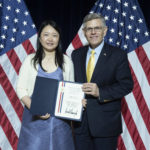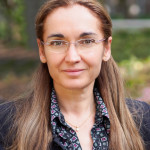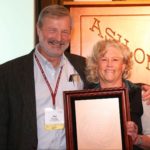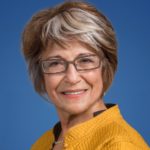Wenjun Zhang, a faculty scientist in Biosciences’ Environmental Genomics and Systems Biology (EGSB) Division and associate professor of chemical and biomolecular engineering at UC Berkeley, is among the 2019 winners of the Presidential Early Career Award for Scientists and Engineers. The prestigious award, established in 1996 and coordinated by the Office of Science and Technology Policy within the Executive Office of the President, is the highest honor bestowed by the United States government on early-career researchers.
Eva Nogales Elected to European Molecular Biology Organization
The European Molecular Biology Organization (EMBO) has elected Molecular Biophysics and Integrated Bioimaging (MBIB) senior faculty scientist Eva Nogales as an associate member. The organization of more than 1,800 leading researchers promotes excellence in the life sciences in Europe and beyond. Nogales, who is also a Howard Hughes Medical Institute (HHMI) investigator and professor at UC Berkeley, is among 56 new members and associate members EMBO will formally welcome at the annual meeting in Heidelberg, Germany, in October 2019.
Claire Tomlin Elected to American Academy of Arts and Sciences
Claire Tomlin, a biological faculty engineer in the Biological Systems and Engineering (BSE) Division, has been elected to the American Academy of Arts and Sciences. The prestigious 239-year old honorary society recognizes accomplished scholars, scientists, and artists in academia, the humanities, arts, business, and government. Tomlin’s research, which is currently conducted primarily at UC Berkeley, where she is a professor of electrical engineering and computer sciences, explores complex systems that have discrete event dynamics as well as continuous time dynamics. Her group studies many topics and problems that can be modeled by hybrid systems as well as more general robotics, such as air traffic control automation, algorithms for decentralized optimization, modeling and analysis of biological cell networks, and unmanned aerial vehicle design and control. The 2019 class of 200-plus new lifetime members announced this week will be inducted at a ceremony in October 2019 in Cambridge, Massachusetts.
Louise Glass Receives Metzenberg Award
Environmental Genomics & Systems Biology (EGSB) Division Director N. Louise Glass was presented with the Robert L. Metzenberg Award during the 30th Fungal Genetics Conference held March 12–17 in Pacific Grove, Calif. Established by the Neurospora research community in 2004, the award was named in honor of the late geneticist Robert Metzenberg’s (1930-2007) seminal contributions to the field. It is given every two to four years at the discretion of the Neurospora Policy Committee to a researcher at any stage of career development whose innovative achievements have significantly advanced the understanding of biology (of Neurospora and beyond). Metzenberg was Glass’s postdoctoral mentor at the University of Wisconsin-Madison.
Cancer Researcher Mina Bissell Receives Two Top Honors
Mina Bissell, a distinguished scientist at the Department of Energy’s Lawrence Berkeley National Laboratory (Berkeley Lab), has been selected to receive two prestigious awards for her pioneering contributions to breast cancer biology and medicine. Her research challenged existing dogma by showing that malignant cells behave much differently in a culture than they do in a body. Bissell’s “Dynamic Reciprocity” model asserts that the support molecules within tissues communicate directly with local cells, thus altering gene expression. Her model has amassed impressive supporting evidence in the 40 years since it was first proposed, and has led to an ever-growing number of advances in the understanding and treatment of cancer.
In recognition of her lifetime achievements, including her extraordinary insights into how a cell’s local environment impacts gene expression and tumor formation, the American Philosophical Society (APS) has chosen Bissell as the recipient of the Jonathan E. Rhoads Gold Medal for Distinguished Service to Medicine. Additionally, she was selected by the Weizmann Institute of Science as one of two recipients of the 2019 Weizmann Women & Science Award in recognition of her trailblazing career as a woman in STEM.
Learn more on the Berkeley Lab News Center.
- « Previous Page
- 1
- …
- 11
- 12
- 13
- 14
- 15
- …
- 25
- Next Page »
Was this page useful?








